 Features
Features

Isolated from the mainland by a river, Tam Hải island commune, in the central province of Quảng Nam is an ideal destination for adventure trips, with crystal-clear water and white beaches.
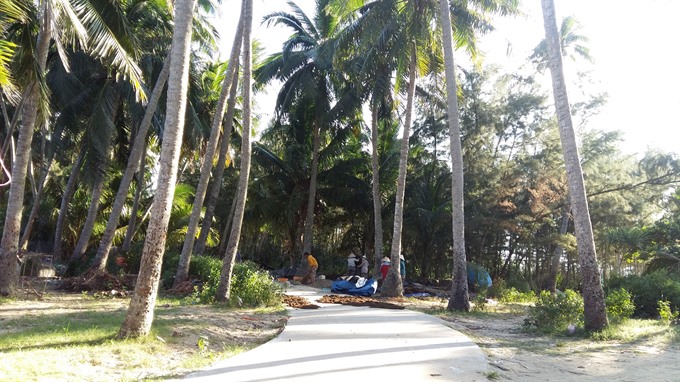 |
| Unspoiled nature: A rural view of Tam Hải Island commmune. VNS Photo Công Thanh |
Isolated from the mainland by a river, Tam Hải island commune, in the central province of Quảng Nam is an ideal destination for adventure trips, with crystal-clear water and white beaches, Hoài Nam reports.
As summer approaches, islanders from Tam Hải commune, just five minutes by boat from Núi Thành District’s Tam Quang Commune, will begin collecting seaweed (sargassum henslowianum) from the waters surrounding the island.
The seaweed harvest lasts nearly two months, so the beach will be crowded with local fishermen during this time.
It’s a bumper crop this year, with the chance to earn more than VNĐ3 million (US$133) – nearly double the commune’s revenue per capita – from selling dried seaweed starting at VNĐ5,000 per kilo.
However, for many the seaweed market offers little reward compared to other sources of income, with fisheries accounting for 70 per cent of trade in the 8,400-population commune.
Nguyễn Ngọc Thọ, 63, who retired from local administration, said harvesting seaweed was an unstable trade and source of income for residents.
“Fishing has been the major breadwinner for islanders for centuries, and aquaculture has emerged as a new trade recently. However, residents haven’t yet become rich from fishing, mostly because they work close to the shore with small boats,” Thọ said.
Thọ, who was born and grew up in the village, said the island emerged 600 years ago and its historical vestiges still remained in Thuận An hamlet at the foot of Bàn Than Mountain.
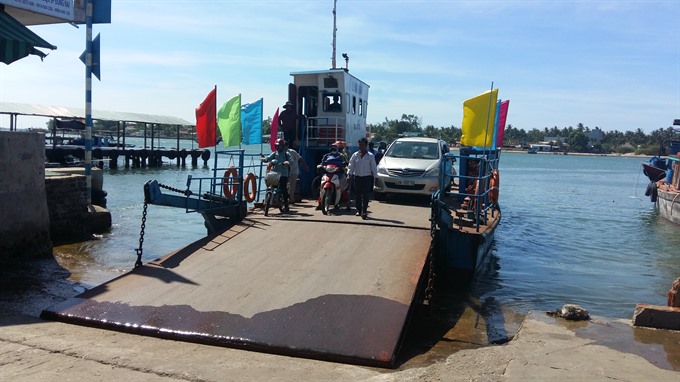 |
| Day trippers: A ferry helps connect Tam Hải Island with mainland Núi Thành District in Quảng Nam Province. VNS Photo Công Thanh |
The village, which is sandwiched between two estuaries – Cửa Lở and An Hòa – has a rich ecology that is perfect for the mass production of seafood and wetland species.
Thọ earns most of his living from squid, caught between 4am and 2pm every day.
Each kilo of squid earns him around VNĐ200,000 ($9).
Baby lobsters are even better, with prices of up to VNĐ350,000 ($15) per kilo.
Untouched island
Just five minutes by boat from Núi Thành town, Tam Hải Island has protected its habitats and lifestyle from urbanisation.
The waters surrounding the island are well protected by coral reefs that stretch over 5km, and a primary mangrove forest, creating a safe shelter for fish.
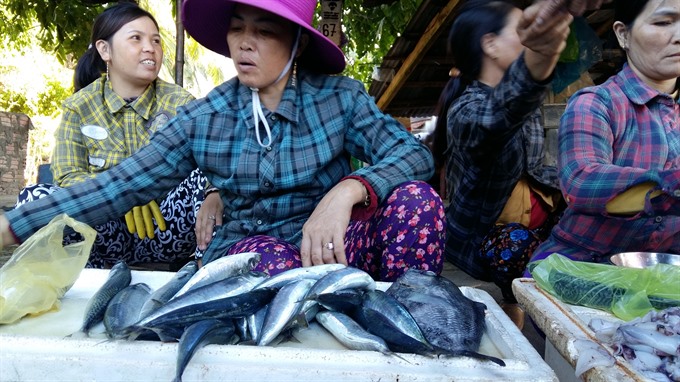 |
| Catch of the day: Local women sell fresh fish from their husband’s latest catch offshore. VNS Photo Công Thanh |
“The island has plenty of natural forests and rich wetlands for both seafood production and tourism, but it needs a Master Plan for future sustainable development,” said vice chairman of the communal people’s committee, Nguyễn Tấn Hùng.
“The commune has only one resort – Le Domaine De Tam Hải resort, a French-style resort, and some guest houses to accommodate around 700 visitors at the weekend,” Hùng said, adding that hospitality education is a challenge for the commune in boosting eco-tourism.
He said only 12 qualified local residents were working at the resort.
According to a report by the commune, the communal fishing fleet of 519 boats caught more than 3,200 tonnes per year, worth a total VNĐ61 billion ($2.7 million), while shrimp farms produced 731 tonnes, equal to VNĐ66 billion (nearly $3 million).
Although shrimp farms were the highest earners for the commune, climate change and poor planning of aquaculture will result in heavy losses for fishermen in the near future, according to Hùng.
The commune has been seeking sustainable measures to improve incomes for islanders, while protecting the environment as well.
Lê Thị Cơ, 45, said she could earn enough to feed her family from selling seaweed, but that was not the only way she makes a living.
“We know seaweed is major food source for fish and aquatic species, but we need money for leisure. Fishing is the best way to earn a living, even if it is risky due to natural disasters,” Cơ said.
Bạch Thị Lan, 50, has just opened a food stall on the beach to serve weekend tourists, hoping that tourism will increase.
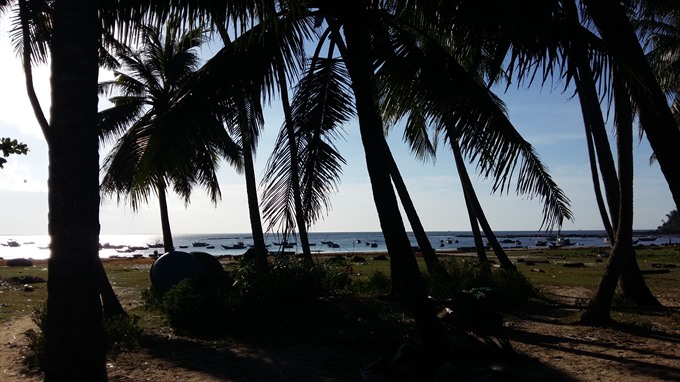 |
| Tropical paradise: A beach in Tam Hải Island commune. VNS Photo Công Thanh |
“It’s still an odd job for me. Anyway, it means I can earn a little beyond my husband’s fishing. I hope more visitors come to the island in the future as islanders could improve their living standards through tourism services including homestays, tour guides, car parking and boat trips,” Lan said.
“We have every thing here, fresh air and beaches, seafood and hospitality. We hope our lives will improve from our traditional trade and the available treasures of nature and landscape.”
Popular sites
The islanders still preserve the largest grave in the central region – where 500 whales are buried. The creatures died on the coast or offshore over the course of many centuries.
Although fresh water is abundant on the island, villagers still take water from two ancient wells at the foot of Bàn Than Mountain for cooking every day.
They said the two wells – which were dug up by the Chăm people – allow access to the most pure sources of underground water from the mountain.
Bàn Than Mountain, which was used as a heliport for US troops during the war in 1960s, is a popular camping site on the island.
“Quảng Nam has chosen the island as a future eco-tour site. A reception centre and pier for cruises is planned for the location,” said vice chairman of the communal people’s committee, Hùng.
“We offer environmentally-friendly investment projects on the island, including electric cars, bicycles and recycled energy,” Hùng added.
He said an islet, Long Thạnh Tây, spanning 100ha, is home to 400 fishermen and is planned as another eco-tour site in connection with the island.
“We design it as an isolated site for nature adventurers. The islet, a 30-minute boat ride from the island and mainland, is perfect for relaxing away from the mainland,” Hùng added.
He said the islet, which is protected by a 7.5ha primary mangrove, will have an organic farm serving the eco-tour site.
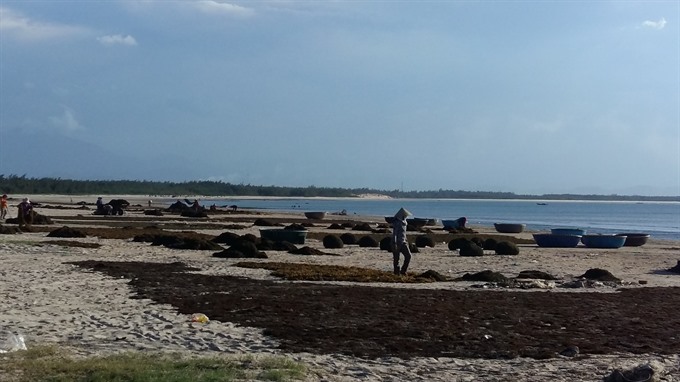 |
| Under the sun: Local fishermen dry seaweed on the beaches of Tam Hải Island. VNS Photo Công Thanh |
Challenges
Waste treatment, renewable energy, hospitality education and erosion are the biggest issues standing in the way of Tam Hải Island becoming an eco-tour site.
Despite launching regular beach cleaning programmes, local residents still dump rubbish on the island’s pristine beaches.
Phạm Văn Thiện, a volunteer, said he regularly saw rubbish on the beach.
“We feel sorry when we see rubbish on the beach. Our volunteer team offers a free cleaning and decoration programme on the island to promote it as a top site in the central region,” Thiện, 23, said.
“We will paint old walls of houses and public roads with murals, and encourage local people to clean the beach, raising awareness on environmental protection,” he said.
Đỗ Kim Hùng, a senior commune official, said the island planned to build a furnace to burn household garbage with a capacity of 10 tonnes each day.
“We have struggled to find a suitable location for a garbage furnace, and have launched campaigns against the use of plastic bags, and promoting the 3-R (reduce, reuse and recycle) programme,” he said.
Early this year, Quảng Nam in co-operation with Quảng Ngãi has launched a new tour, connecting Tam Hải Island with the UNESCO-recognised world biosphere reserve Chàm Island-Hội An and Lý Sơn Island.
Traffic infrastructure is available on the island, but poor public traffic routes from Hội An, Đà Nẵng and Quảng Ngãi has limited the number of visitors.
“Tourists have to use different bus routes from Đà Nẵng and Hội An before getting ferries to the island, while the cruise port is still under construction,” said Nguyễn Ngọc Thăng, a manager at Le Domaine De Tam Hải resort.
“Almost 90 per cent of our customers are foreign, and we take on the cost of bringing them to the island from Đà Nẵng and Hội An,” he said.
Thắng said he hoped the public traffic system will be built in the future to help tourists travel from hubs like Hội An, Chàm Island and Đà Nẵng.
‘Local residents hope of improvements to eco-tourism. Fishermen will live well from their fishing trade and tourism services will protect the island’s ecosystem,” Thọ said.
“More environmentally-friendly measures will be taken by local islanders in harmony with eco-tour services. They will be able to enjoy huge profits through the preservation of nature and island lifestyle.”
He said tourists could explore lagoons, estuaries, beaches and mountains when they visit the island.
No noise and pollution, only sea, sand and the smiles of islanders, he promised. — VNS
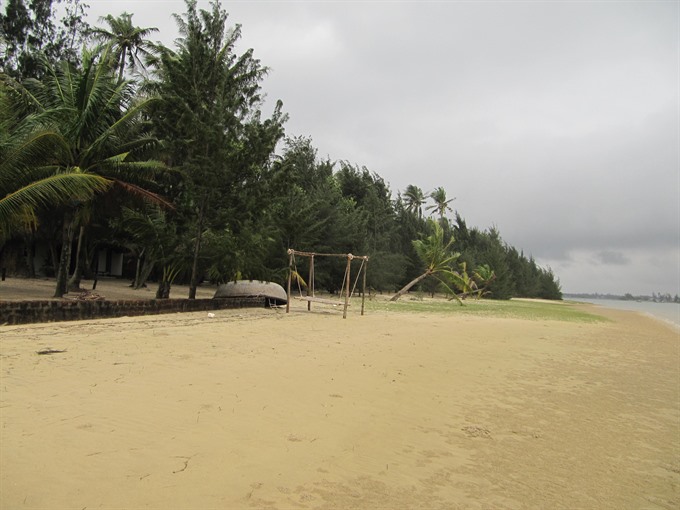 |
| Peaceful spot: A beach of Le Domaine De Tam Hải, a French-style resort offering a tranquil escape from visitors. VNS Photo Công Thanh |
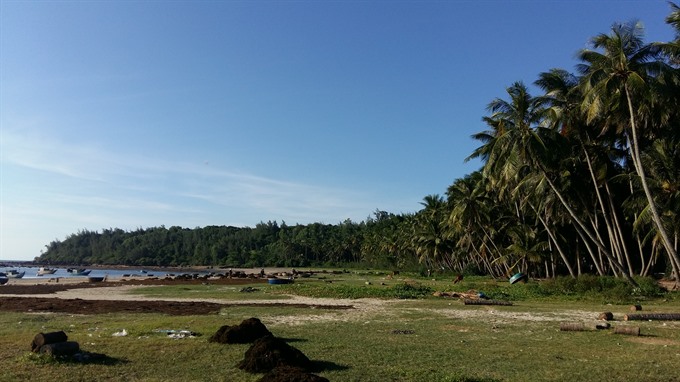 |
| The real deal: An untouched beach on Tam Hải Island in Quảng Nam Province offers adventures and weekend trips. VNS Photo Công Thanh |




